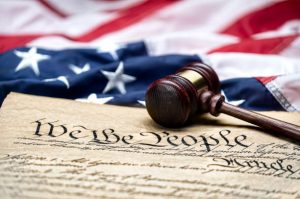
We all learned about the Bill of Rights in school and know that it is an important document that is supposed to protect the rights of Americans. However, US History class was a long time ago for most of us, so it’s worth revisiting the history of this founding document and exploring how it protects our rights, particularly when we are accused of a crime. The Law Office of Andrew Maze can help you understand your rights and their relation to your case.
The Bill of Rights Origin
In short, the Bill of Rights refers to the first ten amendments of the US Constitution. It spells out the numerous civil liberties enjoyed by American citizens in relation to the United States government. The Bill of Rights was written by James Madison and introduced to Congress on June 8th, 1789. Initially, the Constitution was written without a list of enumerated rights, angering many voters, including prominent founding fathers like George Mason. Madison hoped to rectify this by passing the Bill of Rights. The House passed a joint resolution based on Madison’s proposal containing 17 amendments, but the Senate reorganized the resolution to only include 12. Eventually, an agreement was reached between the two chambers of Congress and the amendments were sent to the states for ratification. The required three-fourths of the states needed to amend the Constitution ratified ten of these amendments by the end of 1791. Today, we call these ten amendments the Bill of Rights.
The First Five Amendments
- The First Amendment enshrines the right of the people to speak their minds through freedom of speech, assembly, protest, and petition. The amendment also safeguards the media from government censorship through freedom of the press and protects the rights of people to practice their religion freely by setting up a separation between church and state.
- The Second Amendment protects the right of Americans to keep and bear firearms.
- The Third Amendment prevents the government from quartering soldiers within private homes or properties without the permission of their owners.
- The Fourth Amendment bans the government from unreasonable search and seizure of an individual or their private property by law enforcement. Instead, the amendment requires law enforcement to present evidence of probable cause (usually to a judge) in order to obtain a warrant, or consent of property owners can be given for such searches to be conducted legally.
- The Fifth Amendment provides important legal protections for people accused of crimes. The legal protections guaranteed by the fifth amendment include a rule that the process to charge people with serious criminal charges must be started by a grand jury, as well as a protection against self-incrimination, and a prohibition against trying people twice for the same crime. The amendment also states that the government cannot take your property without providing just compensation, and cannot imprison you without following the due process of law and providing a fair trial.
Our Additional Amendments
- The Sixth Amendment also provides key protections to the criminally accused, including the right to be informed of criminal charges being levied against you, the right to a speedy and public trial with an impartial jury for criminal cases, the right to face your accuser, to call your own witnesses and the right to legal representation. The right to legal representation is especially important because it allows The Law Office of Andrew Maze to help protect all of your constitutional rights when and if you are accused of a crime.
- The Seventh Amendment provides the right to a jury trial for civil cases tried in the federal court system.
- The Eighth Amendment bans the government from levying excessive bail, excessive fines, and cruel or unusual punishments against you
- The Ninth Amendment clarifies that the listing of specific rights in the Constitution does not mean that the people do not have other rights that are not listed within the document.
- The Tenth Amendment explains that the federal government only has the powers delegated to it in the Constitution and that all other powers belong to state governments or the people.
What the Bill of Rights Means for You
The Bill of Rights is the cornerstone of American liberty and the US legal system. Strong legal representation to enforce your rights if you are ever charged with a criminal offense. A person must get due process, for example, before being charged or punished, according to the Fifth Amendment. Legal rights are defined as “due process,” which includes receiving notice. Having a chance to be heard, and having the right to self-defense ensures that a legitimate criminal procedure is followed. Individuals cannot be wrongfully ejected from their homes and penalized without a court hearing. A person also has the right to keep silent in order to avoid being accused of anything against which they are not guilty. When Americans are arrested, they are informed of their Miranda Rights, also known as the Miranda Warning, which informs them of their Fifth Amendment right to avoid being forced to testify against themselves.
At Your Service
The Law Office of Andrew Maze can protect your rights if and when you are accused of crimes such as theft, drug offenses, and driving while under the influence. For all of your legal needs, reach out to the Law Office of Andrew Maze.